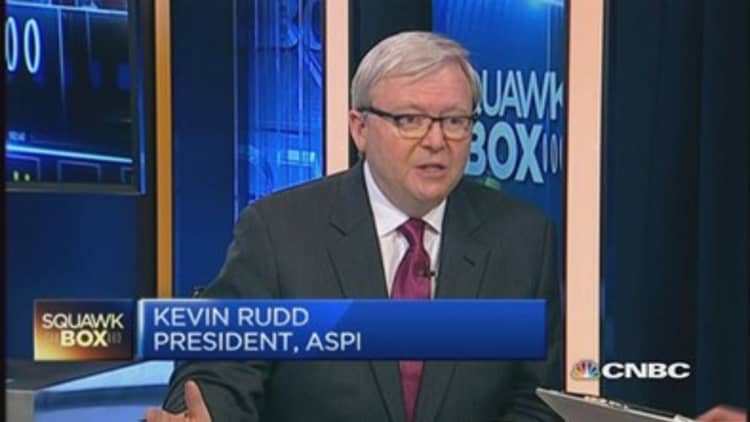
China's sweeping anti-corruption drive won't end anytime soon, with the mainland's President Xi Jinping aiming to permanently restore the communist party's legitimacy and power base, two-time Australian Prime Minister Kevin Rudd told CNBC.
"It's not just a one off [where there] is a massive anti-corruption campaign and then everything goes back to normal," Rudd, who is also the president of the Asia Society Policy Institute, said. "What they're seeking to do is to entrench the anti-corruption machinery into the normal workings of the Chinese state and party."
Read More China sets 2015 growth target at 'around 7%'
The drive has been sweeping, touching corporate executives, the military and even senior party officials, fulfilling Xi's vow to root out graft among "tigers and flies" -- or at every level. The campaign has gone so far as to try to search for assets that may be hidden offshore and has been blamed for a sharp drop in Macau gambling and luxury sales as officials and others try to avoid looking like high-rollers or big spenders.
"As a long standing China analyst going back 35 years, I'm surprised by how intense it's been, how comprehensive it's been and how long it's gone on," Rudd said. "It is frankly going from top to bottom, across the country. "
Xi's power play
Rudd believes the drive is essential to Xi's efforts to maintain the party's legitimacy.
"As he came to power a couple years ago, [he was confronted by] a party whose legitimacy was beginning to erode fundamentally because of corruption … not at a retail level, not at a wholesale level, but at an industrial level in terms of the quantum of corruption," Rudd said. "He knew as a party loyalist that to restore, frankly, legitimacy, he had to take the meat axe to this."
Read More Xi Jinping's anti-corruption purge takes aim at China's military
It's not just about maintaining the party's standing or pursuing reforms aimed at creating a "rule of law." The direct economic cost of corruption is estimated as at least 3 percent of gross domestic product a year, as an annual transfer of assets from the poorer to the richer, according to a 2007 report from the Carnegie Endowment for International Peace.
The anti-corruption campaign hasn't been viewed as entirely successful. China posted one of the worst rises in corruption of any country in 2014's "Corruption Perceptions Index" by lobbying group Transparency International, released in December. The country dropped to 100th out of 175 countries, from 80th in 2013.
Economic reforms
China isn't just showing resolve on the anti-corruption campaign, with the mainland still pursuing a comprehensive economic reform, Rudd noted.
In November of 2013, China's third plenum put forward a plan to shift the country's growth model from labor-intensive manufacturing for export and a dependency on state investment to one more dependent on private consumption, services and the private sector, he noted.
"What they've run into is some real headwinds, not least of all is the condition of the global economy," which has dampened demand for the mainland's exports, Rudd said.
China has set its gross domestic product (GDP) growth target at "around 7 percent" for 2015 - the lowest in 11 years – focusing on quality over quantity as it overhauls its growth model, but still sharply below last year's 7.5 percent target.
But he added, "the political and policy resolve to implement the program is still there. It's still being implemented."
--Alexandra Gibbs contributed to this article.
—By CNBC.Com's Leslie Shaffer; Follow her on Twitter @LeslieShaffer1


